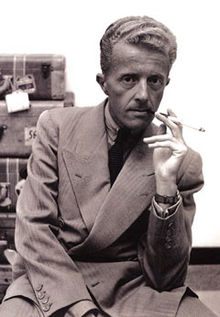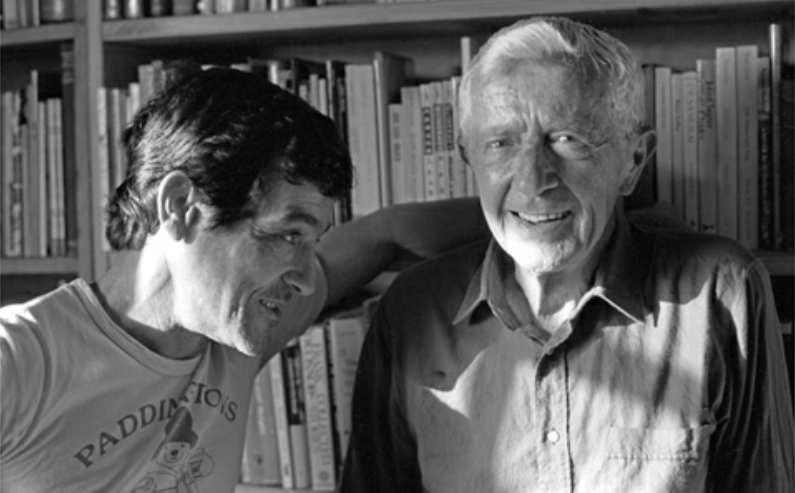

Wife Jane Bowles, Ahmed Yacoubi
Queer Places:
University of Virginia, Charlottesville, VA, Stati Uniti
February House, 7 Middagh St, Brooklyn, NY 11201, Stati Uniti
28 W 10th St, New York, NY 10011
Rue Riad Sultan, Tanger, Marocco
Taprobane Island, Sri Lanka
Lakemont Cemetery, Dundee, NY 14837, Stati Uniti
 Paul
Frederic Bowles (December 30, 1910 – November 18, 1999) was an American
expatriate composer, author, and translator. He became associated with
Tangier, where he settled in 1947 and lived for 52 years to the end of his
life. He composed ballets and incidental theater music for over thirty plays,
including Tennessee Williams' The
Glass Menagerie (1945), Summer and Smoke (1948), and Sweet
Bird of Youth (1959).
Paul
Frederic Bowles (December 30, 1910 – November 18, 1999) was an American
expatriate composer, author, and translator. He became associated with
Tangier, where he settled in 1947 and lived for 52 years to the end of his
life. He composed ballets and incidental theater music for over thirty plays,
including Tennessee Williams' The
Glass Menagerie (1945), Summer and Smoke (1948), and Sweet
Bird of Youth (1959).
Following a cultured middle-class upbringing in New York City, during which he displayed a talent for music and writing, Bowles pursued his education at the University of Virginia before making several trips to Paris in the 1930s. He studied music with Aaron Copland, and in New York wrote music for theatrical productions, as well as other compositions. He achieved critical and popular success with his first novel The Sheltering Sky (1949), set in what was known as French North Africa, which he had visited in 1931.
In 1938, he married Jane Auer, an author and playwright. It was an unconventional marriage; each of their intimate relationships were with people of their own sex, but the couple maintained close personal ties with each other.[12] Bowles has frequently been featured in anthologies as a gay writer, but during his life, he always regarded such typecasting as both absurd and irrelevant.[13] After a brief sojourn in France, the couple were prominent among the literary figures of New York throughout the 1940s. Paul Bowles also worked under Virgil Thomson, as a music critic at the New York Herald Tribune. His light opera The Wind Remains, based on a poem by Federico García Lorca, was performed in 1943 with choreography by Merce Cunningham and conducted by Leonard Bernstein. His translation of Jean-Paul Sartre's play Huis Clos ("No Exit"), directed by John Huston, won a Drama Critic's Award in 1943.
In February 1946, Arthur Gold and Robert Fizdale had a concert at Town Hall, in New York City. The audience did not resemble others in concert halls, since most of the people were either artists or members of the international society, including Perry Empiricos, the son of the Greek shipping magnate; Georges Bemberg, whose family in Argentina had caused three revolutions; the beautiful Peggy O'Brien and her famous debutante daughter, Esme; Edelgey Dinshaw and his sister; the wealthy Oliver and Isa Jennings; Arturo López Willshaw, another faboulous Argentinian multimillionaire; Alice De Lamar with her entourage; as well as the various princesses and marquesas who surrounded Pavel Tchelitchew. Peggy Guggenheim was the patroness of the concert. Two major works were performed, written especially for the occasion by Paul Bowles and John Cage, both of whom Guggenheim admired and encouraged. There was a party afterward at the apartment of Oliver Smith, in attendance also Jane Bowles and John Bernard Myers. As the party was breaking up, Peter Lindamood accidentally pushed the actress Stella Adler down the stairs. She was wearing a Gainsborough-sized hat, and despite the dramatic tumble, when Stella picked herself up, everything was in place, including the hat!

Paul Bowles with Mohammed Mrabet, whose voice he exploited or released, in
his library in Tangier, Morocco, 1991
28 W 10th St
In the summer of 1946, John Bernard Myers performed a puppet show at Spivy’s Roof in New York. He asked Charles Henri Ford to write a puppet play for him, and Ford then suggested he also ask Jane Bowles for a sketch and Paul Bowles to write some music for both. Myers was friendly with Kurt Seligmann, who made the puppets. Ford’s sketch for three characters was called A Sentimental Playlet and involved a clown, a sailor and a wild-haired lady. Bowles’ play was called A Quarreling Pair and had two sisters who lived in separate rooms, one room very messy and the other room very neat. John Latouche came to Myers after the performance, full of effusive congratulations, and shortly after that Myers was taken to Mary McCarthy’s table; she said she had enjoyed the show. When Myers went out to the terrace for some fresh air, a friend beckoned him to a table, where he met Ned Rorem and his companion Maggie von Maggerstadt. Rorem said he too would like to compose some songs for puppets if Myers ever did another show.
In 1947 Bowles settled in Tangier, at that time in the Tangier International Zone, and his wife Jane Bowles followed in 1948. Except for winters spent in Sri Lanka (then known as Ceylon) during the early 1950s, Tangier was Bowles' home for the remainder of his life. He came to symbolize American immigrants in the city. In later years, Bowles entered into a long relationship with a Moroccan painter, Ahmed Yacoubi, the strenght of which threatened the Bowles' marriage; Jane began to feel estranged when the three were together. Bowles met Yacoubi in 1947 and four years later began to live and travel with him. The relationship ended in 1957, when Yacoubi was jailed on charges of sexual involvement with a German youth; later he emigrated to the United States, married, and lost contact with Bowles.
Paul Bowles died in 1999 at the age of 88. His ashes are buried near family graves in Lakemont Cemetery, in upstate New York.
My published books: